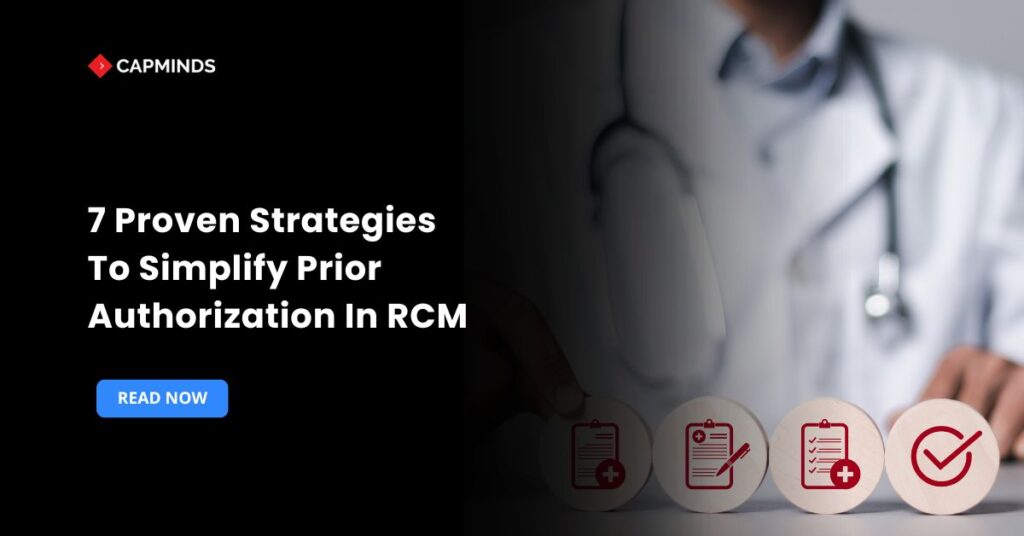7 Proven Strategies To Simplify Prior Authorization In RCM
Prior authorization is a required point of entry to the healthcare sector, yet the manual process has always been a major efficiency drag in the field of RCM. This back and forth, like fax, phone calls, and portal balancing, makes all the administration overloaded, patient care is slowed, and leads to claims denials.
For numerous healthcare institutions, coping with the unclear and constantly evolving needs of various payers is a losing game, which has a direct effect on the financial well-being and performance of the practice.
Organizations can streamline the prior authorization process by changing strategic processes and adopting technology to make it a smooth, high-efficiency part of RCM.
What is Prior Authorization in RCM?
Prior Authorization in RCM, also known as pre-certification or pre-authorization, is the process by which a healthcare provider seeks official approval by the health insurance payer of a patient before making a certain medical service, procedure, device, or medication eligible to receive a covered payment.
It is meant to make sure that the service requested is medically necessary and it is covered by the particular health plan of the patient. The next claim will be virtually denied whenever a mandatory PA is absent, rejected, or missing, causing a delay in the revenue cycle and generating a major amount of rework.
This is a vital but difficult front-end process that directly dictates the success of claims processing and general healthcare reimbursement.
Common Challenges and Delays in Prior Authorization
1. Payer Inconsistency
The regulations of different insurance companies and even within the same plan differ drastically, and the staff is obliged to consult numerous sources.
2. Documentation Burden
Requests take a lot of time, and frequently necessitate a lot of clinical documentation, physician note-taking, lab findings, and results, and this time and error-prone task must be done manually.
3. Lack of Transparency
It is also characterized by the absence of transparency in terms of long hold times and the status process, thus causing delays and missed deadlines upon following up on a request that has been submitted.
4. High Denial Rates
Claim denials are caused due to errors in the submission process, such as lost information, wrong codes, and late submission are one of the leading causes of claim denials, costing the company resources and time to appeal.
5. Staff Burnout
The repetitive, stressful environment of the manual PA workflow is a source of administrative and employee stress.
Related: A Complete Front-End RCM Workflow: From Patient Intake to Claim Submission
7 Ways to Enhance the Prior Authorization Process
1. Check First and Look Often
Include real-time eligibility and benefit checks in your patient scheduling system. Immediately after a booking has been made, confirm whether a PA is needed. This is the most effective measure of minimizing the claim denials on grounds of missing authorization.
2. Centralize Payer Rules
Develop and sustain a centralized body of knowledge over the top 10- 20 payers. This list must be clear on what services/CPT codes must be provided by the PA, documentation that should be done, and how each payer would prefer to be provided. Continuously revise this resource to control the constantly changing needs.
3. Adopt a Specialized PA Team
Bring the PA role under a small team or individual. Such single-minded attention establishes skills and continuity in managing intricate prior authorization in RCM processes, whereby all the submission provisions are executed in the initial attempt.
4. Normalize Clinical Documentation
It is a standardized internal template or checklist of the required information on the clinical side to prove medical necessity. Educate clinical staff to conduct full, accurate, and concise documentation that clearly justifies the procedure being requested and makes the creation of the final submission by the PA team easier.
5. Proactive Follow-Up Schedule
The PA follow-up should be treated as an accounts receivable effort. Introduce a rigid, uniform follow-up system, such as automated messages on Day 2, Day 5, and Day 10 after submissions to monitor the status of each request and speed up the process, so that the requests do not get sucked into the black hole of a payer.
6. Analyze and Resolve Denials
Monitor all the PA-related denials and classify the underlying reason, such as missing clinical documentation, late submission, or non-covered service. It is this data that you can use to keep improving on your front-end processes and training of the staff, so that you have closed the gaps that cause you to repeat rejections.
7. Leverage Electronic Submission
Embrace electronic prior authorization portals and solutions at every chance. This will replace long-lasting fax messaging and phone calls with an organized digital messaging system, which will greatly improve the turnaround time and consequently lessen the errors caused by human hands.
Role of Automation and AI in Prior Authorization
1. Automated Eligibility Checks
The prior authorization management software can be connected with EHRs and clearinghouses to automatically check the insurance coverage of the patient and confirm the requirement of a PA, and the service can even be scheduled.
2. Predictive Analytics with AI
AI-based tools can be used to analyze historical denial data, payer-specific rules, and patient clinical notes to determine the potential of a PA request to suffer a denial. This enables the staff to take the initiative to modify the submission or appeal strategy, and this also aids in minimizing claims denials.
3. Robotic Process Automation
RPA bots are capable of dealing with tedious and repetitive tasks of the process of prior authorization, including logging in to various payer portals, retrieving required clinical information on the EHR, and automatically filling in request forms. This leaves human personnel to work on a higher level and the complex appeal.
4. Improved Documentation Extraction
Natural language processing, a subdivision of AI, can scan unstructured, complicated physician notes and extract the precise clinical information necessary to demonstrate medical necessity, which would guarantee that the request is full and maximize the likelihood of simplifying healthcare reimbursement.
Accelerate Your Revenue Cycle with CapMinds Prior Authorization Services
Prior authorization delays shouldn’t slow down your care delivery or your cash flow. At CapMinds, we empower healthcare organizations to transform complex, manual workflows into streamlined, automated operations, ensuring faster approvals, reduced denials, and improved revenue outcomes.
Our comprehensive digital health tech services are designed to optimize every phase of your revenue cycle with precision and compliance.
Our Key Services Include:
- Prior Authorization Services – End-to-end automation for faster payer approvals and reduced turnaround times.
- RCM Services – Complete revenue cycle management to boost collections and minimize denials.
- Medical Auditing Services – Identify revenue leaks, ensure compliance, and enhance billing accuracy.
CapMinds combines AI, RPA, and analytics to simplify your authorization process, enhance claim accuracy, and accelerate reimbursements, so you can focus on patient care.
Partner with CapMinds today to automate your prior authorization and RCM workflows for lasting financial performance.




